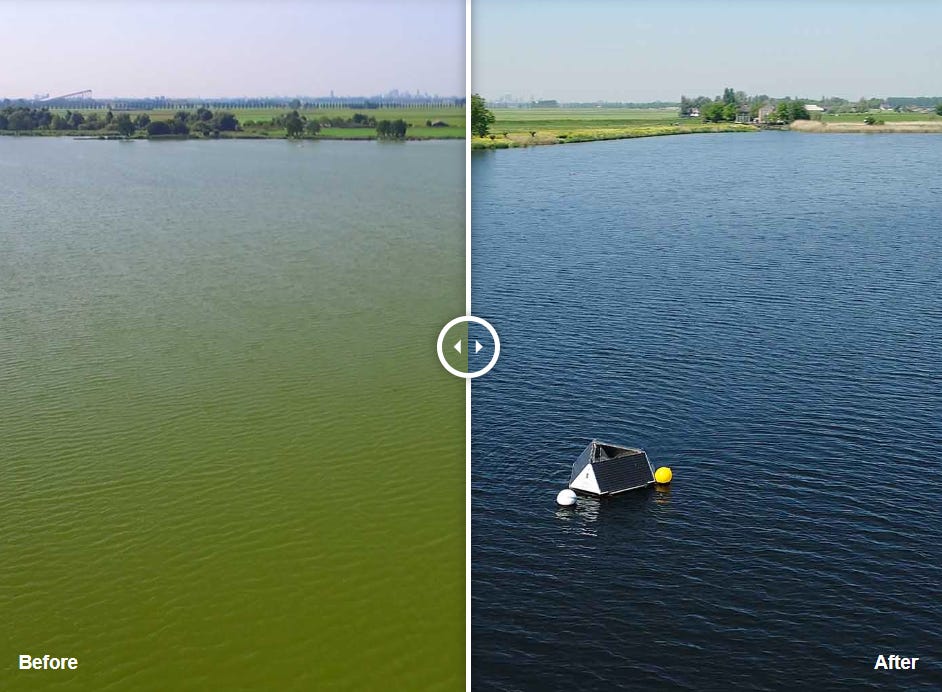Diving Into Water - part nine: Oh buoy those algae blooms
New technology to tackle those occasional taste and odor issues
It’s time for another update in my ongoing series of water reports. If you’ve lived in Lafayette for a few years you’ve most likely experienced some days in the summer when you turn on your tap and there is a distinct odor from the water, often accompanied by a not-so-delicious taste. I too have experienced this but I have to say not so frequently as in the past.
At the April 16th city council meeting there is a rather innocuous water-related item on their consent agenda. The consent agenda is a list of items that require council approval but don’t need a staff presentation such as purchases, minutes from their last meeting, and contracts. The mayor reads the list and unless a councilor has a question they vote to approve the entire consent agenda and move on.
Here’s that consent agenda item that caught my eye:
Contract / LG Sonic US LLC / Algae Control and Reservoir Monitoring
The staff memo says:
“If approved, LG Sonic US LLC will provide a 100% solar-powered water quality sensing and ultrasonic algae control buoys to reduce the risk and amount of algae in the reservoirs”
I thought some folks would find this interesting. ( I raise my hand here). It seems to fit with Lafayette’s focus on green technologies such as solar and cutting back on chemical use. I reached out to our Public Works Director Jeff Arthur to ask a couple of questions and wondered if he would provide me with a blurb I could share with you. He not only wrote the following he also provided me with a before and after comparison photograph you can see at the top of the page.
FROM PUBLIC WORKS DIRECTOR JEFF ARTHUR
The City primarily relies on Baseline Reservoir and the Goose Haven Reservoir Complex (287 & Isabelle Road) to store water between the time we are able to divert it from natural creeks (largely during spring runoff of winter snowpack) and when we treat it to drinking water standards at the Baseline Water Treatment Facility for distribution to customers over the course of the year. During the summer, our reservoirs periodically experience conditions that are favorable to algae blooms. Both the algae blooms, and the chemicals released when algae eventually die off, create challenges for effective water treatment. Some types of algae can also create risks for people and pets that come in contact with the reservoirs.
The City has historically focused on chemical treatment to manage algae and address associated taste and odor impacts. This has involved application of herbicides directly into the reservoirs (from a boat) followed by use of additional chemicals (such as activated carbon) during the treatment process to manage taste and odor. We have made significant progress over the last several years in being more strategic in our reservoir management and treatment; but this approach remains expensive, is largely reactive, and provides variable results.
As part of the 2024 budget, staff proposed purchase of several buoys that use ultrasound waves to disrupt algae formation. The ultrasound waves impact the ability of algae to float. This cuts off their access to sunlight, not only reducing the potential for large blooms, but also causing slower release of the chemicals contained in the algae that cause taste and odor. We anticipate that this new technology will reduce or eliminate the need for herbicide application, reduce treatment costs, and provide a favorable return on investment within a few years.
The photo (from the selected manufacturer, LGSonic) shows one of the proposed buoys in use. The City currently uses devices with a similar appearance (“Solar Bees”) for aeration of reservoirs. At the April 16, 2024 meeting, Council will consider a contract to purchase a total of nine devices that will be installed at Baseline Reservoir, Goose Haven Reservoir Complex, and Waneka Lake. Five of the devices include both the ultrasonic algae control and a water quality monitoring function and are just over $54k each. The remaining four devices provide only the algae control function and are just over $47k each.





Forward thinking!!!! Thank you for sharing!